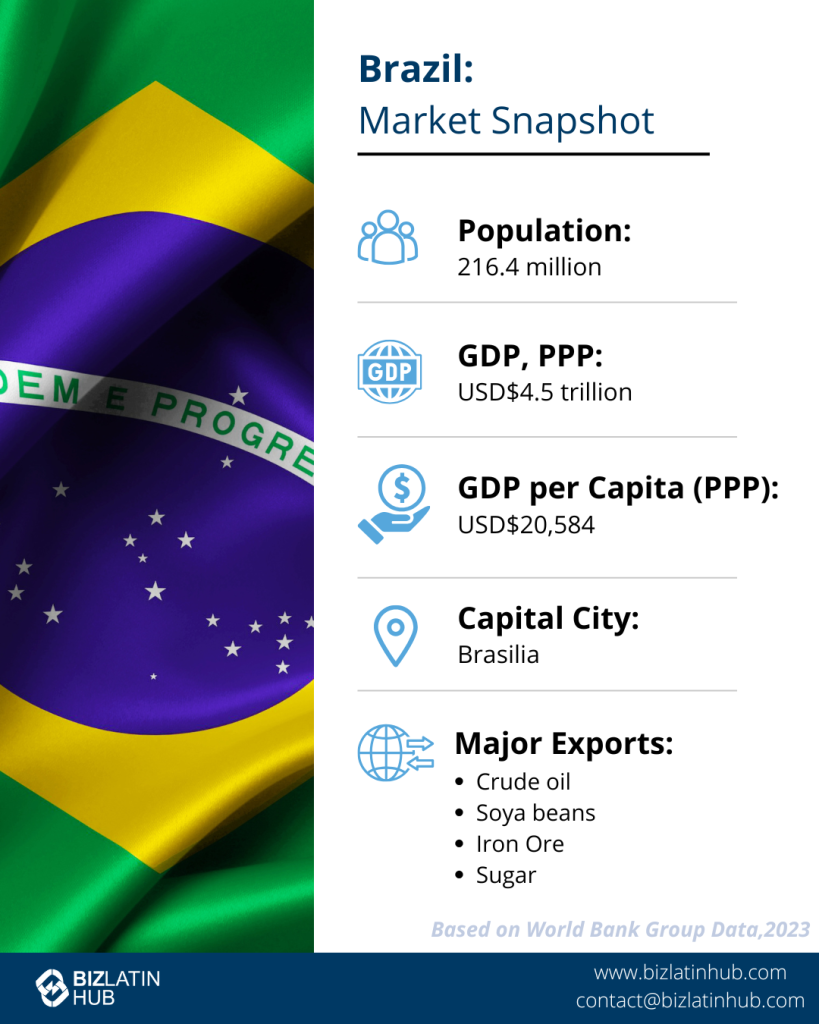Liquidating a company in Brazil requires compliance with a formal process involving shareholder decisions, tax and labor clearance, and deregistration with multiple authorities. Whether for business restructuring or full market exit, liquidation must be done legally to avoid fines and regulatory issues. This 2025 guide covers the full procedure, eligibility rules, expected timelines, and key stakeholder roles. This may be important after company formation in Brazil.
Key Takeaways on Liquidation in Brazil
| 7 steps to liquidate a company in Brazil | Shareholders’ meeting Appointment of liquidator Notice to authorities Publication of notice Asset liquidation and debt settlement Employee settlement Account closure and tax compliance |
| What is the timeframe needed to liquidate a company in Brazil? | The liquidation process will normally take between nine and 16 months, assuming the entity is in good standing and no rectification work is required. |
| What are the reasons to liquidate a company in Brazil? | These vary, but the key point is to stay compliant and in good standing with the authorities. |
| What causes involuntary liquidation in Brazil? | Involuntary liquidation is initiated when a creditor who has not received payment contacts a court. |
What is the process of liquidation in Brazil?
The liquidation process in Brazil involves the following steps:
Shareholders’ meeting:
The company’s shareholders hold a meeting and formally resolve to dissolve the entity and begin liquidation.
Appointment of liquidator:
A liquidator is appointed to handle the process. This person can be a legal representative or third party.
Notice to authorities:
Formal notice is submitted to the Junta Comercial, Receita Federal, and local/state tax authorities.
Publication of notice:
A notice of liquidation is published in the Official Gazette and a widely circulated newspaper to alert creditors. A 60-day period is triggered for claim submissions.
Asset liquidation and debt settlement:
Assets are sold and liabilities are paid, prioritizing taxes and labor-related debts.
Employee settlement:
All employees are terminated and paid in accordance with Brazilian labor law, including FGTS, severance, and benefits.
Account closure and tax compliance:
Final tax filings are submitted, debts cleared, and the company applies to cancel its CNPJ with Receita Federal.
Final deregistration:
The company is removed from government databases, completing the legal closure.
Voluntary liquidation procedure
As previously mentioned, Brazil has a great deal of bureaucracy. Company formation in Brazil involves a long and rigorous procedure, and liquidation in Brazil requires the same lengthy process and multitude of authorities.
The voluntary liquidation process is initiated by the shareholders and involves:
- Approval and appointment – Shareholders vote to dissolve the company and appoint a liquidator
- Registration – The decision is registered with the Junta Comercial
- Public notice – A notice is published in the Official Gazette and a newspaper, allowing creditors 60 days to file claims
- Settlement – The liquidator pays debts, fulfills labor and tax obligations, and prepares a final balance sheet
- Certificates – Clearance certificates are obtained from INSS, FGTS, and Receita Federal
- CNPJ cancellation – The liquidator files for federal deregistration
- Final deregistration – The company is removed from all government registries
How long does it take to liquidate a company in Brazil?
Liquidation in Brazil generally takes 9 to 16 months for a company in good standing. Judicial liquidation or non-compliance may extend the process.
Timeline factors include:
- Unpaid taxes or incomplete filings with Receita Federal
- Labor liabilities, including pending employee disputes
- Delays in certificate issuance from FGTS and INSS
- Backlogs in Junta Comercial or Receita Federal
- Public notice periods that require a minimum 60-day window
- Holiday periods that slow processing of approvals
Efficient handling of documentation and early compliance checks can help speed up the process.
Business eligibility for liquidation in Brazil
To be eligible for voluntary liquidation in Brazil, the company must be compliant and solvent. The process involves extensive bureaucracy and coordination with multiple government bodies. The key requirements and steps are:
Shareholder agreement and closure minute:
All shareholders must sign a ‘closure minute’ that confirms the company’s decision to dissolve. This document records how remaining assets will be distributed and names the liquidator. If shareholders disagree, the matter may go to court.
Appoint a liquidator:
The liquidator is responsible for managing debt repayments, asset distribution, and regulatory coordination.
Engagement with INSS (social security):
Even if the company has no employees, it must obtain a Certidão Negativa de Débito (CND) from INSS, confirming no outstanding social security debts.
FGTS compliance:
The company must request a Certificado de Regularidade do FGTS from Caixa Econômica Federal. This certifies compliance with employee benefit and dismissal obligations.
Municipal and state tax deregistration:
The company must cancel its registrations in municipal and state tax databases by contacting the local Secretaria da Fazenda and providing documentation that proves the company is in liquidation.
Federal tax settlement with Receita Federal:
To close federal obligations, the company must submit two key documents:

- Final balance sheet and tax returns
- Application for a Certidão Conjunta Negativa de Débitos
These documents must match Receita Federal’s internal records to confirm no outstanding taxes.
Presentation of compliance certificates to Junta Comercial:
The liquidator presents the required certificates to the Junta Comercial, including:
- Certidão Negativa de Débito (CND) – INSS
- Certidão Conjunta de Tributos Federais – Receita Federal
- Certificado de Regularidade do FGTS – Caixa Econômica Federal
CNPJ cancellation and final step:
Once approved, the company files for cancellation of its CNPJ via the Receita Federal website using the Documento Básico de Entrada (DBE). The form must be signed and notarized. Once validated, the company’s federal registration is terminated.

Shareholders:
- Must unanimously agree to dissolve the company
- Sign the closure minute
- Appoint the liquidator
- Are entitled to residual assets only after all debts are paid
Creditors:
- Must be notified via published notices
- Have 60 days to submit claims
- Are paid in the following legal order:
- Federal tax debts
- Social security and labor-related obligations
- Secured creditors
- Unsecured creditors
Employees:
- Must be formally terminated and paid all entitlements, including:
- Wages
- 13th salary
- Accrued vacation
- FGTS deposits
- Severance
- The company must request clearance from FGTS and INSS to confirm compliance before proceeding with deregistration
Failure to meet any labor obligations will delay or block CNPJ cancellation.
FAQs on company liquidation in Brazil
Based on our extensive experience these are the common questions and doubts of our clients when liquidating a business in Brazil.
1. What is the process of liquidation in Brazil?
The liquidation process involves the following principal activities:
Shareholders’ meeting: The company’s shareholders convene a meeting and resolve to dissolve the company and start the liquidation process.
Appointment of liquidator: A liquidator is appointed, who may be a third party or the company’s legal representative. The liquidator oversees the liquidation process.
Notice to authorities: Formal notice of the company’s decision to dissolve and liquidate is sent to the Commercial Board, Federal Revenue Service, and state and municipal tax authorities.
Publication of notice: A notice of the company’s dissolution and liquidation is published in the Official Gazette and a local newspaper to inform creditors and other interested parties.
Asset liquidation and debt settlement: The company proceeds to liquidate its assets and settle its debts, ensuring proper distribution of funds to creditors.
Employee settlement: Settlement of employee obligations, including payment of wages, severance, and other entitlements in accordance with labor laws.
Account closure and tax compliance: Closure of the company’s accounts and fulfillment of tax obligations, including the submission of final tax returns.
2. How long does it take to liquidate a company in Brazil?
The liquidation process will normally take between nine and 16 months, assuming the entity is in good standing and no rectification work is required.
3. What are the reasons to liquidate a company in Brazil?
There are a number of reasons you may do so, such as the venture becoming unworkable, a change in laws or simple failure in the relevant markets. You may wish to close one business in order to start another or you may want to leave the country for other reasons. For whatever reason you eventually decide to liquidate a company in Belize, it is best to do so in accordance with the law.
4. Can you be forced to liquidate a company in Brazil?
Involuntary liquidation is initiated when a creditor who has not received payment contacts the court. Judges usually take more deliberation in these types of cases. It is worth noting that, creditors often use this method to collect payments quickly from companies as payment collection proceedings can be a very long process in Brazil.
5. Can I liquidate a company if it has no assets or operations?
Yes, but even dormant companies must comply with tax and labor clearance procedures. You’ll need to obtain the same compliance certificates and file the same paperwork as an active company.
6. Is it possible to liquidate a company with unpaid debts?
Not through voluntary liquidation. You must first resolve debts or enter judicial liquidation, which is overseen by a court.
7. Can liquidation be reversed once it begins?
Only if shareholder resolutions are passed before public notices are published and filings made. After notices and submissions to the Junta Comercial, reversal is complex and often not permitted.
8. Does liquidation impact the legal representative?
Yes. The legal representative remains responsible for compliance, filings, and cooperation with the liquidator until deregistration is complete.
9. Are there deadlines to start liquidation after ceasing operations?
There’s no strict deadline, but companies that stop operations and remain registered face fines for missed tax filings and may be blacklisted by Receita Federal.

Expert Support for Company Liquidation in Brazil
Liquidating a business in Brazil requires coordinating with multiple agencies and ensuring compliance with federal, state, and labor obligations. Biz Latin Hub provides complete legal and accounting support for this process.
Our services include:
- Drafting shareholder resolutions
- Appointing and coordinating with the liquidator
- Managing INSS, FGTS, and Receita Federal filings
- Securing all clearance certificates
- Preparing the final balance sheet
- Filing for CNPJ cancellation
With offices across Brazil and bilingual experts, we ensure a smooth and fully compliant liquidation.
Contact us today to begin the process with a dedicated local team.






